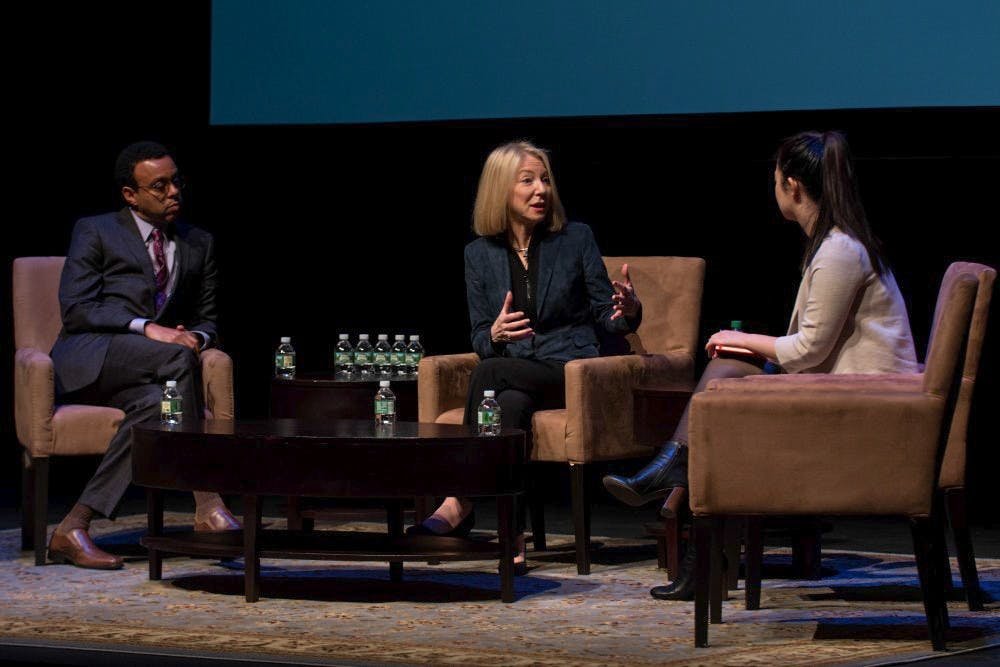Penn Wellness — the umbrella coalition of student wellness clubs — will host the second Campus Conversation on April 2 to kick off the Mental Wellness Week 2018. The first Campus Conversation was hosted by Penn's administration last October in response to a string of student deaths, natural disasters, and political instability.
It was presented as an opportunity to engage with Penn's administration and to hear about concrete steps to address University policy, but many students felt it actually prohibited any conversation with the University leadership.
"I feel the students were very underrepresented from the discussion on stage," College sophomore Grace Bridy told The Daily Pennsylvanian after the first event in October, adding that she thought the content of the conversation was lacking. "I think we all know that we should be compassionate and understanding. I think people came here looking for answers, and it kind of sounded like rhetorically driven speech."
This time, administrators will be even further removed from the conversation as student groups take charge of the event.
The first Campus Conversation was moderated by Undergraduate Assembly President and College senior Michelle Xu, who asked Penn President Amy Gutmann and Provost Wendell Pritchett pre-submitted questions.
In an email to the DP, Executive Director of the Provost's Office Leo Charney wrote that Chaplain Charles Howard will moderate the conversation and that James Pawelski from the Positive Psychology Center will be a member of a panel, but that "other than that, it is completely student-driven."

Chaplain Charles Howard
Charney noted that Pritchett will attend the event.
RELATED:
Provost on new Wellness site: 'We expect it to change. We want the community to give us advice.'
At the 'Campus Conversation,' administrators shared personal stories, but no policy solutions
"As in the first Campus Conversation, we hope to bring together our community to continue our efforts on what we can do to take care of ourselves and others and to foster individual and community resilience," the upcoming Campus Conversation's program descriptions reads.
Just as the first panel followed a series of student deaths in the fall semester — College senior Nicholas Moya, Penn Vet student Brett Cooper, Wharton senior Henry Rogers, and Penn Law student Justin Hamano — the second Campus Conversation comes after great tragedy as well.
On Dec. 31, College freshman William Steinberg died in a plane accident with his family, becoming the eighth Penn student to die in 2017. Soon after, campus was struck by the news of the disappearance and subsequent death of College sophomore Blaze Bernstein, which was later ruled a homicide. Less than a week after Bernstein was found dead in Orange County, Calif., a first-year Penn Law student, Jonathan Lumpkin, died in his apartment in Sansom Place East.
Many leaders of wellness groups, however, are excited about planning the second event.
Wharton senior Phillip Isom, the former director of external affairs for Penn Benjamins, attended the initial conversation and said he was pleased to learn that the wellness community would be hosting a second event.
"The panel was very interesting and put together so I hope there’s the ability to ask questions from the crowd to engage with them more," Isom said. "In general, as to addressing more things, just the fact that there is a second conversation is super helpful because a lot of these issues can’t be solved in one or two afternoons, so periodic events is a huge step in the right direction."
College junior Serena Vargulick, the co-chair of Penn Wellness, has been helping plan this event.
"[Members of Penn Wellness] wanted to gauge what people really wanted from this one, and we can’t talk to each student individually to see what they want, but we did try to implement more Q&A," Vargulick said.
Mental wellness has recently become a focal point in Penn's agenda. In January, the University unveiled a new wellness website centralizing all campus mental wellness resources and launched an administrative review of Counseling and Psychological Services' operations guided by a team of management experts at Penn Medicine.
Deputy News Editor Amy Liu contributed reporting to this article.



